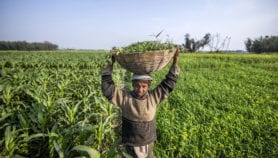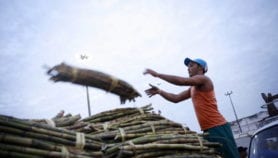By: Wagdy Sawahel
Send to a friend
The details you provide on this page will not be used to send unsolicited email, and will not be sold to a 3rd party. See privacy policy.
Scientists in Egypt have produced drought-tolerant wheat by transferring a gene from barley into a local wheat variety.
The researchers, at Cairo’s Agricultural Genetic Engineering Research Institute (AGERI), say their technique reduces the number of irrigations needed from eight to one, and that the wheat could be cultivated with rainfall alone in some desert areas.
The AGERI team hope to develop their technique and address biosafety issues in order to commercialise the transgenic wheat seeds as the first genetically modified (GM) product on the Egyptian market.
The research findings, which have been accepted for publication in the journal Physiologia Plantarum, were presented last month at a symposium on applied biotechnology in Egypt organised by AGERI and the Egyptian Centre for Biotechnology Information.
Water stress caused by drought is a major factor limiting plant growth and crop productivity worldwide. The researchers showed that by transferring a gene called ‘HVAI1’ from barley to wheat, the plants could tolerate low water levels for longer before their leaves wilted.
Following laboratory tests, the GM wheat was tested in greenhouse and field trials. The field trials were conducted for three seasons, starting in 2001-2002.
During the 2002-2003 season, Ahmed Bahieldin, the plant geneticist who led the research, and his colleagues compared the growth of the GM wheat and a local variety under normal rainfall conditions, without irrigation. The GM plants were taller and had higher yields than the non-modified plants.
“Now we are transferring the gene for drought tolerance to other local wheat varieties using traditional plant breeding programmes,” Bahieldin told SciDev.Net. “In future, GM wheat plants with improved drought tolerance could be incorporated into breeding programmes throughout the Mediterranean region.”
According to Bahieldin, just 38 per cent of Egypt’s demand for wheat is met domestically because the country’s lack of water limits the area of land that can be cultivated. He also says boosting plants’ ability to deal with water stress might mitigate other environmental stresses.
“The gap between supply and demand makes GM drought-tolerant wheat very important for increasing cultivation in areas where sub-optimal conditions such as water deficit, salinity or high temperature prevail,” says Bahieldin.
Mohammed Hamoud, head of genetic research division at the Egyptian Tanta University’s botany department cautiously welcomes the research findings, acknowledging the potential for drought resistant GM wheat to boost agricultural output in the Western and Sinai deserts.













